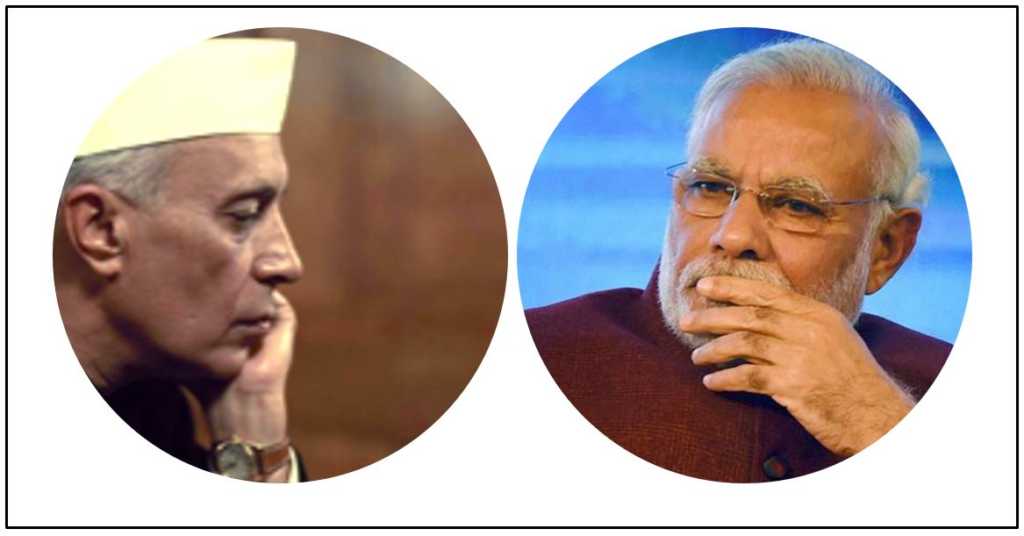Narendra Modi and Chinese leader Xi Jinping met each other at the BRICS Conference in Xiamen City, China today. The meeting between the two leaders was expected to be awkward as their two nations were, not long ago, engaged in an eyeball to eyeball confrontation at Doklam plateau in Bhutan. Despite all of China’s provocations, insults and warnings, India held its ground and the two sides returned to the pre-stalemate scenario as was being demanded by India repeatedly. India’s resolve to not let China bully its way into forcing India to make territorial concessions was evident in the way India’s National Security Advisor, Ajit Doval tackled a particularly aggressive Chinese state councillor, Yang Jiechi. When asked by Jiechi whether Doklam was Indian territory (Doklam is Bhutanese territory which India is obliged to protect in view of its relations with Bhutan), Doval replied sharply by asking the Chinese whether all disputed territories become Chinese by default. India’s cool composure, matched by an unseen level of aggressiveness in the background ensured that the Chinese were forced to come to a respectable compromise. No wonder that Modi government’s handling of the Doklam issue has won it accolades even from seasoned critics of the government. That the dragon, huffed and puffed and finally chose to come to a negotiated settlement is being touted by the government as a major Diplomatic victory for India.
In that sense, it seems that China was completely unprepared to deal with a ‘New India’. Perhaps, it is true that India of 2017 is no longer the India of 1962 or earlier.
And certainly, it is true that Prime Minister Narendra Modi is no Pandit Jawaharlal Nehru when it comes to protecting India’s strategic interests.
When India gained its independence, Nehru looked towards the Socialist world with a kind of love and admiration that should ordinarily have been reserved for Edwina Mountbatten. When China turned Communist in 1949, Nehru finally found a Socialist neighbour with whom he could tango. He assumed that the Chinese, who like the Indians had been victims of imperialism, would respond to India’s overtures and help establish an Asian bloc on world affairs. Sadly, while the Chinese professed their love for the Hindi-Chini bhai bhai slogan, they worked behind India’s back to ensure that their strategic objectives were met at all costs, even if this put them on warpath with India.
The borders between India and China, or rather India and Tibet are long and result from a series of agreements between British & Tibetan/Chinese agents. Many of these agreements happened at a time when China was engulfed with strife and did not exercise any sovereign control over Tibet. The borders between Tibet and Ladakh, in a region called Aksai Chin, were the result of one such agreement, which the Chinese, in spite of participating in the discussions, did not sign. Evidently, the absence of Chinese signature, did not impact the implementation of the agreement in anyway. For some time after India’s independence, the northern borders of the country, especially in the Aksai Chin region were not shown clearly. Even so, the region was believed to be an undisputed part of India. From 1953 onwards, the Chinese began constructing roads connecting Xinjiang region with Tibet. A portion of the road passed through the Aksai Chin region, but Nehru refused to accord any seriousness to the issue. By 1957, the road was operational and Aksai Chin had effectively been cut off from India. In 1958, when Nehru was informed that the Chinese were in illegal possession of Aksai Chin, he declined to consider an air reconaissance of the region and suggested an informal land reconaissance. It is another matter that the reconnoitering party was ambushed and jawans were killed/captured by the Chinese. A meek ‘informal’ note was shared with the Chinese informing them of old, established frontiers and ‘regrettable’ Chinese road building efforts in Indian territory by Chinese workers without passports and Indian Visas.
http://www.rediff.com/…/nehrus-aksai-chin-blun…/20170203.htm
After ignoring the obvious signs from China that it intended to change the ground reality without so much as a discussion with India, Nehru proceeded to hoodwink the Parliament. In April 1959, Nehru chose to mislead the Parliament by stating that members should not be perturbed by news reports on Chinese road construction in Indian territory as China had made no such claims. It was only in August that Nehru accepted that a road connecting Xinjiang with Tibet had been constructed in Indian territory. By then, Aksai Chin was irretrievably lost. Added to this was the Indian government’s abject failure in preventing the fall of Tibet to the Chinese communist forces. With the fall of Tibet to China, which happened on Nehru’s watch and the loss of Aksai Chin, China strengthened its position vis a vis India. This was to have catastrophic results in 1962 when Nehruvian fantasies on China, coupled with poor leadership on the ground resulted in a shameful loss for India. More than anything else, It is the ignominy of 1962 that Indians are unable to forget and the Chinese never miss to remind India.
But as the Chinese learnt recently, India of 2017 – Modi’s India is vastly different from the one they beat in 1962.
